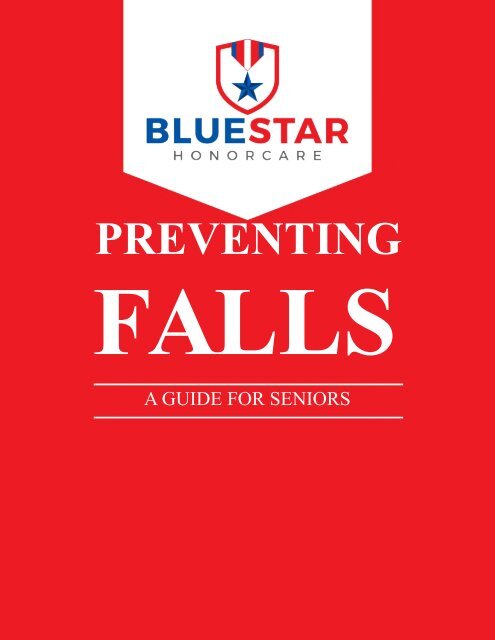How to Preventing Falls - A Guide for Seniors
You also want an ePaper? Increase the reach of your titles
YUMPU automatically turns print PDFs into web optimized ePapers that Google loves.
PREVENTING<br />
FALLS<br />
A GUIDE FOR SENIORS
Falling is a serious matter<br />
Of those one in three seniors who fall each year, only half tell their doc<strong>to</strong>rs. Furthermore, falling one<br />
time doubles your chances of falling again.<br />
From the Center <strong>for</strong> Disease Control and Prevention:<br />
› Each year, 2.5 million older people are treated in emergency departments <strong>for</strong> fall injuries.<br />
› Over 700,000 patients a year are hospitalized because of a fall injury, most often because of a head injury<br />
or hip fracture.<br />
› More than 95% of hip fractures are caused by falling, usually by falling sideways.<br />
› <strong>Falls</strong> are the most common cause of traumatic brain injuries (TBI).<br />
Many people who fall, even if they’re not injured, become afraid of falling again, and so cut down on their<br />
everyday activities. That lack of activity causes weakness, which increases the risk of another fall.<br />
1<br />
5 2<br />
4 3
Read on <strong>to</strong> see<br />
how YOU can<br />
minimize the<br />
risk of falling<br />
Some important first steps<br />
<strong>to</strong> take:<br />
› Have an annual physical that includes an<br />
evaluation <strong>for</strong> cardiac and blood pressure<br />
problems. Have your bone density tested<br />
<strong>to</strong> recognize signs <strong>for</strong> developing osteoporosis, <strong>to</strong>o.<br />
› Ask your doc<strong>to</strong>r or pharmacist about the medicines you are<br />
taking, both prescription and non-prescription.<br />
Some medications can cause you <strong>to</strong> become light-headed or<br />
dizzy, and that can lead <strong>to</strong> falls. Also, as you age, medicines can affect you differently.<br />
› Maintain a healthy diet with enough calcium and Vitamin D intake from both food and supplements.<br />
Keep those bones and muscles healthy!<br />
› Have your vision checked every year. If you are not seeing clearly, your balance may be affected and<br />
you also are at risk of overlooking fall risks, such as objects in your way.<br />
› Stay physically active. Check with your doc<strong>to</strong>r <strong>to</strong> find out what exercise and physical<br />
activity is best <strong>for</strong> you. Exercising enhances balance and coordination, and that will help<br />
prevent falls.<br />
› Check your shoes. Wearing footwear with non-slip soles that are not <strong>to</strong>o thick helps you <strong>to</strong> maintain your<br />
balance. There are many safe choices out there that are still fashionable, so you don’t have <strong>to</strong> <strong>for</strong>ego<br />
looking good!
Make your home a safe zone<br />
There are many hidden risk fac<strong>to</strong>rs at home that can cause a fall. Ask a loved one <strong>to</strong> go through your<br />
home with you, searching each room or area <strong>for</strong> items that might pose a risk.<br />
Kitchen<br />
› Clean up spills immediately. Keep a roll of paper <strong>to</strong>wels<br />
handy.<br />
› S<strong>to</strong>re everything within easy reach. Do not stand on chairs<br />
or boxes.<br />
› If you must use a step-s<strong>to</strong>ol, make sure it has a grabrail<br />
along the <strong>to</strong>p.<br />
› Remove all throw rugs and use are rugs that are held securely<br />
in place with rubber backing.<br />
Bathroom<br />
› Make sure the bathroom is well-lit, and keep a night light on at all<br />
times.<br />
› Use a rubber mat or place nonslip adhesive tex-tured<br />
strips inside the tub or shower.<br />
› Use a rubber mat or rug with rubber backing next <strong>to</strong><br />
the tub or shower <strong>to</strong> get in and out safely.<br />
› Install sturdy grab bars on the bathtub and show-er walls.<br />
› Use a <strong>to</strong>ilet with a raised seat and/or use armrests <strong>to</strong> help<br />
stabilize yourself.<br />
› Replace glass shower walls with non-shattering materials.
Bedroom and Living Areas<br />
› Keep the rooms well-lit.<br />
› Keep clutter off the floor.<br />
› Arrange furniture so that you have a clear pathway as you<br />
walk.<br />
› Repair any loose flooring.<br />
› Keep a flashlight by your bed and on a sofa’s end table in<br />
case power goes out.<br />
› Secure any area rugs with rubberized backing.<br />
Additional Suggestions<br />
› Keep stairs clear of clutter, boxes, etc.<br />
› Make sure you have adequate lighting and handrails on both<br />
sides of stairways.<br />
› Hardwood steps should have non-slip treads applied.<br />
› Put a bell on your small pets so you know when they are near<br />
your feet.<br />
› Don’t walk a large dog unless it is trained not <strong>to</strong> pull you when on<br />
the leash.<br />
› Install motion-detec<strong>to</strong>r lights so that they turn on when you step<br />
outside at night.<br />
Resources: Center <strong>for</strong> Disease Control & Prevention and American Academy of Orthopaedic Surgeons
Blue Star Service Solutions, Inc. 7619<br />
Standish Place Rockville, MD 20855<br />
TOLL FREE PHONE #<br />
1-800-300-1724<br />
https://www.bluestarhonorcare.com



